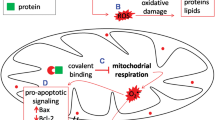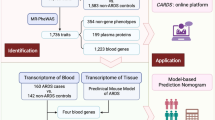Abstract
Azoxymethane (AOM) is a widely used carcinogen to study chemical-induced colorectal carcinogenesis and is an agent for studying fulminant hepatic failure. The inter-strain susceptibility to acute toxicity by AOM has been reported, but its association with host genetics or gut microbiota remains largely unexplored. Here a cohort of genetically diverse Collaborative Cross (CC) mice was used to assess the contribution of host genetics and the gut microbiome to AOM-induced acute toxicity. We observed variation in AOM-induced acute liver failure across CC strains. Quantitative trait loci (QTL) analysis revealed three chromosome regions significantly associated with AOM toxicity. Genes located within these QTL, including peroxisome proliferator-activated receptor alpha (Ppara), were enriched for enzyme activator and nucleoside-triphosphatase regulator activity. We further demonstrated that the protein level of PPARα in liver tissues from sensitive strains was remarkably lower compared to levels in resistant strains, consistent with protective role of PPAR family in liver injury. We discovered that the abundance levels of gut microbial families Anaeroplasmataceae, Ruminococcaceae, Lactobacillaceae, Akkermansiaceae and Clostridiaceae were significantly higher in the sensitive strains compared to the resistant strains. Using a random forest classifier method, we determined that the relative abundance levels of these microbial families predicted AOM toxicity with the area under the receiver-operating curve (AUC) of 0.75. Combining the three genetic loci and five microbial families increased the predictive accuracy of AOM toxicity (AUC of 0.99). Moreover, we found that Ruminococcaceae and Lactobacillaceae acted as mediators between host genetics and AOM toxicity. In conclusion, this study shows that host genetics and specific microbiome members play a critical role in AOM-induced acute toxicity, which provides a framework for analysis of the health effects from environmental toxicants.





Similar content being viewed by others
References
Abdella EM, Mahmoud AM, El-Derby AM (2016) Brown seaweeds protect against azoxymethane-induced hepatic repercussions through up-regulation of peroxisome proliferator-activated receptor gamma and attenuation of oxidative stress. Pharm Biol 54(11):2496–2504. https://doi.org/10.3109/13880209.2016.1160938
Abdo N, Xia M, Brown CC et al (2015) Population-based in vitro hazard and concentration-response assessment of chemicals: the 1000 genomes high-throughput screening study. Environ Health Perspect 123(5):458–466. https://doi.org/10.1289/ehp.1408775
Cano-Gamez E, Trynka G (2020) From GWAS to function: using functional genomics to identify the mechanisms underlying complex diseases. Front Genet 11:424. https://doi.org/10.3389/fgene.2020.00424
Cichocki JA, Furuya S, Venkatratnam A et al (2017) Characterization of variability in toxicokinetics and toxicodynamics of tetrachloroethylene using the Collaborative Cross mouse population. Environ Health Perspect 125(5):057006. https://doi.org/10.1289/EHP788
Daisley BA, Trinder M, McDowell TW, Collins SL, Sumarah MW, Reid G (2018) Microbiota-mediated modulation of organophosphate insecticide toxicity by species-dependent interactions with Lactobacilli in a Drosophila melanogaster Insect Model. Appl Environ Microbiol. https://doi.org/10.1128/AEM.02820-17
Dornbos P, LaPres JJ (2018) Incorporating population-level genetic variability within laboratory models in toxicology: from the individual to the population. Toxicology 395:1–8. https://doi.org/10.1016/j.tox.2017.12.007
Dubey V, Ghosh AR, Bishayee K, Khuda-Bukhsh AR (2015) Probiotic Pediococcus pentosaceus strain GS4 alleviates azoxymethane-induced toxicity in mice. Nutr Res 35(10):921–929. https://doi.org/10.1016/j.nutres.2015.08.001
Gangarapu V, Yildiz K, Ince AT, Baysal B (2014) Role of gut microbiota: obesity and NAFLD. Turk J Gastroenterol 25(2):133–140. https://doi.org/10.5152/tjg.2014.7886
Giacomini KM, Yee SW, Mushiroda T, Weinshilboum RM, Ratain MJ, Kubo M (2017) Genome-wide association studies of drug response and toxicity: an opportunity for genome medicine. Nat Rev Drug Discov 16(1):1. https://doi.org/10.1038/nrd.2016.234
Harrill AH, McAllister KA (2017) New rodent population models may inform human health risk assessment and identification of genetic susceptibility to environmental exposures. Environ Health Perspect 125(8):086002. https://doi.org/10.1289/EHP1274
Imai K, Keele L, Tingley D, Yamamoto T (2014) Comment on Pearl: practical implications of theoretical results for causal mediation analysis. Psychol Methods 19(4):482–487. https://doi.org/10.1037/met0000021
Jiang C, Xie C, Lv Y et al (2015) Intestine-selective farnesoid X receptor inhibition improves obesity-related metabolic dysfunction. Nat Commun 6:10166. https://doi.org/10.1038/ncomms10166
Karkar L, Abu-Toamih Atamni HJ, Milhem A, Houri-Haddad Y, Iraqi FA (2020) Assessing the host genetic background effects on type 2 diabetes and obesity development in response to mixed-oral bacteria and high-fat diet using the collaborative cross mouse model. Anim Model Exp Med 3(2):152–159. https://doi.org/10.1002/ame2.12117
Kersten S, Stienstra R (2017) The role and regulation of the peroxisome proliferator activated receptor alpha in human liver. Biochimie 136:75–84. https://doi.org/10.1016/j.biochi.2016.12.019
Khan AA, Yurkovetskiy L, O’Grady K et al (2019) Polymorphic immune mechanisms regulate commensal repertoire. Cell Rep 29(3):541–550. https://doi.org/10.1016/j.celrep.2019.09.010
Konganti K, Ehrlich A, Rusyn I, Threadgill DW (2018) gQTL: a web application for QTL analysis using the collaborative cross mouse genetic reference population. G3 (Bethesda) 8(8):2559–2562. https://doi.org/10.1534/g3.118.200230
Koontz JM, Dancy BCR, Horton CL, Stallings JD, DiVito VT, Lewis JA (2019) The role of the human microbiome in chemical toxicity. Int J Toxicol 38(4):251–264. https://doi.org/10.1177/1091581819849833
Lash LH, Hines RN, Gonzalez FJ, Zacharewski TR, Rothstein MA (2003) Genetics and susceptibility to toxic chemicals: do you (or should you) know your genetic profile? J Pharmacol Exp Ther 305(2):403–409. https://doi.org/10.1124/jpet.102.039925
Li F, Jiang C, Krausz KW et al (2013) Microbiome remodelling leads to inhibition of intestinal farnesoid X receptor signalling and decreased obesity. Nat Commun 4(1):2384. https://doi.org/10.1038/ncomms3384
Liu T, Ahn H, Sun W, McGuinness LR, Kerkhof LJ, Haggblom MM (2016) Identification of a Ruminococcaceae species as the Methyl tert-Butyl Ether (MTBE) degrading bacterium in a methanogenic consortium. Environ Sci Technol 50(3):1455–1464. https://doi.org/10.1021/acs.est.5b04731
Luo YS, Cichocki JA, Hsieh NH et al (2019) Using Collaborative Cross mouse population to fill data gaps in risk assessment: a case study of population-based analysis of toxicokinetics and kidney toxicodynamics of tetrachloroethylene. Environ Health Perspect 127(6):67011. https://doi.org/10.1289/EHP5105
MacFarlane AJ, McEntee MF, Stover PJ (2014) Azoxymethane-induced colon carcinogenesis in mice occurs independently of de novo thymidylate synthesis capacity. J Nutr 144(4):419–424. https://doi.org/10.3945/jn.113.186007
Mao JH, Kim YM, Zhou YX et al (2020) Genetic and metabolic links between the murine microbiome and memory. Microbiome 8(1):53. https://doi.org/10.1186/s40168-020-00817-w
McMillin M, Grant S, Frampton G et al (2019) Elevated circulating TGFbeta1 during acute liver failure activates TGFbetaR2 on cortical neurons and exacerbates neuroinflammation and hepatic encephalopathy in mice. J Neuroinflammation 16(1):69. https://doi.org/10.1186/s12974-019-1455-y
Mosedale M, Cai Y, Eaddy JS et al (2019) Identification of candidate risk factor genes for human idelalisib toxicity using a collaborative cross approach. Toxicol Sci 172(2):265–278. https://doi.org/10.1093/toxsci/kfz199
Neufert C, Becker C, Neurath MF (2007) An inducible mouse model of colon carcinogenesis for the analysis of sporadic and inflammation-driven tumor progression. Nat Protoc 2(8):1998–2004. https://doi.org/10.1038/nprot.2007.279
Pawlak M, Lefebvre P, Staels B (2015) Molecular mechanism of PPARalpha action and its impact on lipid metabolism, inflammation and fibrosis in non-alcoholic fatty liver disease. J Hepatol 62(3):720–733. https://doi.org/10.1016/j.jhep.2014.10.039
Peyrou M, Ramadori P, Bourgoin L, Foti M (2012) PPARs in liver diseases and cancer: epigenetic regulation by MicroRNAs. PPAR Res 2012:757803. https://doi.org/10.1155/2012/757803
Rachakonda V, Jadeja RN, Urrunaga NH et al (2015) M1 muscarinic receptor deficiency attenuates azoxymethane-induced chronic liver injury in mice. Sci Rep 5:14110. https://doi.org/10.1038/srep14110
Rusyn I, Gatti DM, Wiltshire T, Kleeberger SR, Threadgill DW (2010) Toxicogenetics: population-based testing of drug and chemical safety in mouse models. Pharmacogenomics 11(8):1127–1136. https://doi.org/10.2217/pgs.10.100
Saul MC, Philip VM, Reinholdt LG, Center for Systems Neurogenetics of A, Chesler EJ (2019) High-diversity mouse populations for complex traits. Trends Genet 35(7):501–514. https://doi.org/10.1016/j.tig.2019.04.003
Schoenrock SA, Kumar P, Gomez AA et al (2020) Characterization of genetically complex Collaborative Cross mouse strains that model divergent locomotor activating and reinforcing properties of cocaine. Psychopharmacology 237(4):979–996. https://doi.org/10.1007/s00213-019-05429-3
Shan W, Nicol CJ, Ito S et al (2008) Peroxisome proliferator-activated receptor-beta/delta protects against chemically induced liver toxicity in mice. Hepatology 47(1):225–235. https://doi.org/10.1002/hep.21925
Snijders AM, Langley SA, Kim YM et al (2016) Influence of early life exposure, host genetics and diet on the mouse gut microbiome and metabolome. Nat Microbiol 2:16221. https://doi.org/10.1038/nmicrobiol.2016.221
Sohn OS, Ishizaki H, Yang CS, Fiala ES (1991) Metabolism of azoxymethane, methylazoxymethanol and N-nitrosodimethylamine by cytochrome P450IIE1. Carcinogenesis 12(1):127–131. https://doi.org/10.1093/carcin/12.1.127
Sohn OS, Fiala ES, Requeijo SP, Weisburger JH, Gonzalez FJ (2001) Differential effects of CYP2E1 status on the metabolic activation of the colon carcinogens azoxymethane and methylazoxymethanol. Cancer Res 61(23):8435–8440
Styblo M, Douillet C, Bangma J, Eaves LA, de Villena FP, Fry R (2019) Differential metabolism of inorganic arsenic in mice from genetically diverse Collaborative Cross strains. Arch Toxicol 93(10):2811–2822. https://doi.org/10.1007/s00204-019-02559-7
Threadgill DW, Miller DR, Churchill GA, de Villena FP (2011) The collaborative cross: a recombinant inbred mouse population for the systems genetic era. ILAR J 52(1):24–31. https://doi.org/10.1093/ilar.52.1.24
Wankhade UD, Zhong Y, Kang P et al (2018) Maternal high-fat diet programs offspring liver steatosis in a sexually dimorphic manner in association with changes in gut microbial ecology in mice. Sci Rep 8(1):16502. https://doi.org/10.1038/s41598-018-34453-0
Wu W, Lv L, Shi D et al (2017) Protective effect of Akkermansia muciniphila against immune-mediated liver injury in a mouse model. Front Microbiol 8:1804. https://doi.org/10.3389/fmicb.2017.01804
Yu L, Zhao XK, Cheng ML et al (2017) Saccharomyces boulardii administration changes gut microbiota and attenuates D-galactosamine-induced liver injury. Sci Rep 7(1):1359. https://doi.org/10.1038/s41598-017-01271-9
Zeiss CJ, Gatti DM, Toro-Salazar O et al (2019) Doxorubicin-induced cardiotoxicity in Collaborative Cross (CC) mice recapitulates individual cardiotoxicity in humans. G3 (Bethesda) 9(8):2637–2646. https://doi.org/10.1534/g3.119.400232
Zhang L, Xie C, Nichols RG et al (2016) Farnesoid X receptor signaling shapes the gut microbiota and controls hepatic lipid metabolism. mSystems. https://doi.org/10.1128/mSystems.00070-16
Zheng D, Liwinski T, Elinav E (2020) Interaction between microbiota and immunity in health and disease. Cell Res 30(6):492–506. https://doi.org/10.1038/s41422-020-0332-7
Acknowledgements
This work was supported by the Lawrence Berkeley National Laboratory Directed Research and Development (LDRD) program funding under contract DE AC02-05CH11231 (JHM and AMS). Additional support was provided by grants from the National Natural Science Foundation of China (No. 81872481) (YY).
Author information
Authors and Affiliations
Contributions
JHM and AMS designed the study. CZ, LH, SYL, SEC, AMS and JHM performed experiments and collected the data. CZ, HC, YZ and DWT performed data analysis. DWT, YY, FZ, SEC and YX contributed to data interpretation and critical revision of text. All the authors approved the manuscript for publication.
Corresponding authors
Ethics declarations
Conflict of interest
The authors declare that they have no conflicts of interest.
Ethical approval
All animal experiments were approved by the Institutional Animal Welfare and Research Committee at Lawrence Berkeley National Laboratory.
Additional information
Publisher's Note
Springer Nature remains neutral with regard to jurisdictional claims in published maps and institutional affiliations.
Supplementary Information
Below is the link to the electronic supplementary material.
Rights and permissions
About this article
Cite this article
Zhong, C., He, L., Lee, SY. et al. Host genetics and gut microbiota cooperatively contribute to azoxymethane-induced acute toxicity in Collaborative Cross mice. Arch Toxicol 95, 949–958 (2021). https://doi.org/10.1007/s00204-021-02972-x
Received:
Accepted:
Published:
Issue Date:
DOI: https://doi.org/10.1007/s00204-021-02972-x




